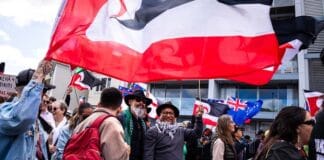The new government’s review of the Northern Territory intervention is stacked with supporters of the policy, and looks set to whitewash the disastrous impact on Aboriginal people in the NT
THERE WERE protests all around the country on June 21 to mark one year since the Howard government initiated the Northern Territory Intervention. Only weeks earlier, Indigenous Affairs Minister Jenny Macklin announced that Labor’s promised review of the Intervention would report by September 30. The review panel is stacked with people who are pro-Intervention.
Who is doing the reviewing?
Chair of the three person review board is Peter Yu. Yu is also on the Halls Creek Project Management Committee—a committee set up by the WA government in 2007 to implement measures similar to the NT Intervention. When the NT intervention was announced Yu said he would welcome military intervention “if it was done for the right reasons”.
The second person is Marcia Ella Duncan. Her position on the Intervention is unclear but she certainly has not been a critic.
An “independent expert group” consisting of 11 people will advise the board. This group includes Tobias Nganbe and Anne Rebgetz, co-principals of Our Lady of the Sacred Heart School in Wadeye. Both were close to Mal Brough when the Intervention was being devised. Mavis Malbunka is Vice President of the Ntaria Council (Hermannsburg), the only Aboriginal community in the NT to fully back the Intervention. Perhaps the lone critic is David Ross from the Central Land Council, but even the Land Council’s criticism is muted.
The review has been stacked to give Rudd and Indigenous Affairs Minister Jenny Macklin the pro-Intervention position they clearly favour. The Intervention is no longer a Howard era policy that Labor has been lumbered with. This is now Labor’s Intervention and its fundamental racism and paternalism are set to remain intact.
Before the review is completed, the Intervention Task Force itself has flagged a new phase of the Intervention. It will replace alcohol bans with management plans. Most disturbingly it proposed cutting support to communities decreed to be “economically unviable”. While Macklin played down the idea of forcibly closing communities, she admitted that “private sector interest” was already driving funding decisions.
Welfare quarantining, the focus of much of the resistance to the Intervention in the NT, could also be modified—perhaps using the Queensland “family responsibility” model pushed by Noel Pearson. In any case, the emerging campaign will have to respond to the new developments in the racist Intervention.
Peter Yu says he wants to “steer away from the political issues” and review the intervention on a factual basis. But the facts present a nightmare scenario for Aboriginal people in prescribed areas. Unless he recommends an end to the Intervention he is supporting a political whitewash.
By Robert Nicholas





